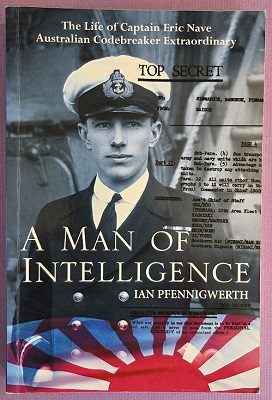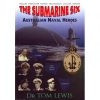Description
Title: A Man of Intelligence – The Life of Captain Eric Nave Australian Codebreaker Extraordinary
Author: Pfennigwerth, Ian
Condition: Very Good Plus – Minor discolouration to the page block. War Museum stamp on the half title page, which has had the top right corner cut off.
Edition: 1st Edition
Publication Date: 2010
ISBN: 1877058416
Cover: Soft Cover without Dust Jacket – 304 pages
Comments: This is a second-hand book
Eric Nave, an Australian naval officer, was the first to unravel Japanese naval telegraphy and to break Imperial Japanese Navy codes. Yet few Australians have ever heard of the exploits and achievements of this exceptionally talented man who did so much for the safety and security of our country. Nave’s success in penetrating Japan’s codes ensured that in the South West Pacific Area, Allied operational forces were able to strike the Japanese Army and Navy where and when it would cause most harm.
Nave’s impressive Japanese language skills, and almost-instinctive ability to spot the main features and weak points of intercepted messages, gained him widespread respect and admiration within the closed confines of Allied codebreaking before, during and after World War Two. In his career he served the Australian and British navies, UK Government and General MacArthur’s Combined Bureau in Brisbane, the last under the auspices of the Australian Army!
Between 1940 and 1942, almost single-handedly, he constructed Australia’s first signals intelligence bureau, making Australia as aware of Japanese intentions as the US and UK Governments. At war’s end he organised the compilation of the cribs on how Japanese codes had been broken, and a most valuable resource for attacking other countries’ systems. Nave was closely involved in the development of the Defence Signals in Melbourne, and in 1946 he led the delegation which ensured Australia’s inclusion in the Allied signals intelligence arrangements, which continue to this day.
In 1950 Nave joined ASIO and became responsible for the policies and standards for personnel vetting and security in Australian government departments and agencies. His major successes included the security arrangements for the Woomera Joint Test Facility, elements of the Petrov defection, and security of the 1954 Royal Tour and the 1956 Melbourne Olympic Games. Retiring in 1959, he became involved with ex-service personnel and served as National President of the Naval Association for three terms.
This biography tells how a bright lad with ambition and with a powerful streak of luck ¬entered and carved his own special niche in the arcane world of codebreaking. It sets his achievements against the geopolitical shifts which led to war with Japan in 1941. It explores the dysfunctional nature of US signals intelligence and its effects on war in the South West Pacific, and charts the rise of Australia’s quantitative and qualitative contribution to Allied intelligence. It concludes with Eric’s work in post-war signals intelligence, his time at ASIO and his retirement activities, including his frustrated attempts to publish his memoirs, and an assessment of his place in history.
Ian Pfennigwerth spent 35 years in the Royal Australian Navy in seagoing, staff and overseas postings, his last ten years being spent primarily in the intelligence sphere. He served as Director of Naval Intelligence for three years and was the Defence Attache in Beijing for two. Ian retired to Port Stephens NSW in 2000 where he has developed his passion for Australian naval history.





